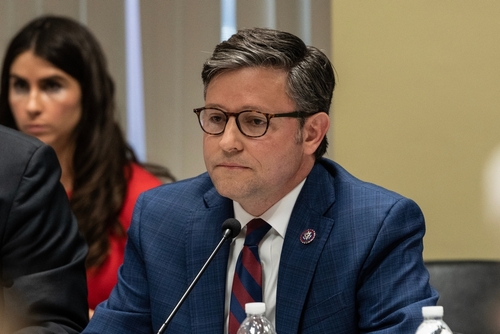America First Republicans Blast Johnson Over FISA Capitulation

Last week, the House of Representatives voted to reauthorize the Foreign Intelligence Surveillance Act (FISA), sparking outrage among America First lawmakers. The controversial vote allows federal agencies to continue warrantless domestic spying on American citizens.
Speaker Mike Johnson (R-LA) was a longtime and vocal critic of FISA before he took the leadership position. Since taking the gavel, he has reversed his stance. Now, the GOP members who put him in the Speaker’s seat are expressing extreme dissatisfaction with his change of heart.
In tight votes, efforts led by a group of Republicans to implement stricter controls — including a mandatory warrant for surveillance and a prohibition against federal agencies buying American data from online brokers — were defeated. This has allowed for the continuation of what many see as unconstitutional surveillance practices.
Stalin Would Have Killed For The FISA Reform Congress Just Passed https://t.co/AQgaReKxv7
— 𝗠𝗔𝗚𝗔 1775🇺🇸 (@Mar50cC5O) April 16, 2024
“When I was a member of Judiciary, I saw all of the abuses of the FBI,” Johnson stated. Those abuses seem to now have no effect on Johnson’s decision to support warrantless surveillance of American citizens.
This shift has not gone unnoticed. Rep. Matt Gaetz (R-FL) — who led last year’s movement to oust former Speaker Kevin McCarthy (R-CA), which led to Johnson’s ascendancy — and other House Judiciary members are deeply disappointed with Johnson’s one-eighty on privacy. “These were views that the Speaker deeply held, like, 20 minutes ago,” Gaetz said.
BREAKING: Thomas Massie is cosponsoring with MTG a Motion to Vacate Speaker Mike Johnson. https://t.co/qHQc80HqNX
— Charlie Kirk (@charliekirk11) April 16, 2024
Rep. Thomas Massie (R-KY) has voiced strong opposition, even co-sponsoring a resolution filed by Rep. Marjorie Taylor Greene (R-GA) to oust Johnson from the Speakership, citing his reversal on crucial privacy issues as a primary reason.
Massie said, “The will of the majority was to have a warrant provision, and he was on the other side of that. There are no red lines here. I just think he lost a lot of capital with that vote.”
Freedom Caucus member Rep. Scott Perry (R-PA) also came out strongly against FISA as reauthorized and Johnson’s failure to lead on the issues. He said, “The American people don’t want their liberties taken away. They want their Fourth Amendment liberties to be upheld.”
Rep. Chip Roy (R-TX) went even further, accusing Johnson of turning against his former GOP colleagues on the House Judiciary Committee. “What we ended up with was a bill that didn’t have the warrant protections in the bill. It was going to be forced to be added as an amendment. And then the Speaker of the House put his finger on the scale against the amendment. And that pretty much is the story,” Roy said.
The fiery Texan added: “This is not off of the House floor, so everybody’s got to go home and answer their constituents over the next 72 hours about why they are siding with the intelligence agencies and the deep state and the swamp over the rights and the liberties of the American people. That was the choice today,” he continued. “And every single person in this body, no matter if you’re a Republican or a Democrat, voted against an amendment to protect Americans, to protect them with a warrant, and they’ve got to answer to it.”
Johnson’s pivot from privacy advocacy to supporting broad surveillance powers exemplifies leaders’ challenges when privy to national security data. However, his reversal also highlights a potentially dangerous precedent where security imperatives justify expansive surveillance capabilities, potentially at the cost of civil liberties.
